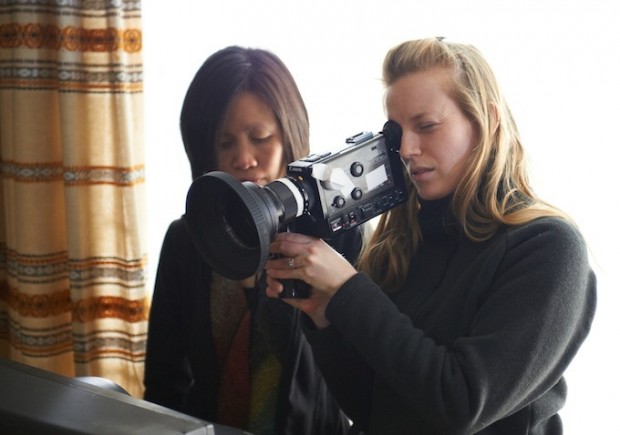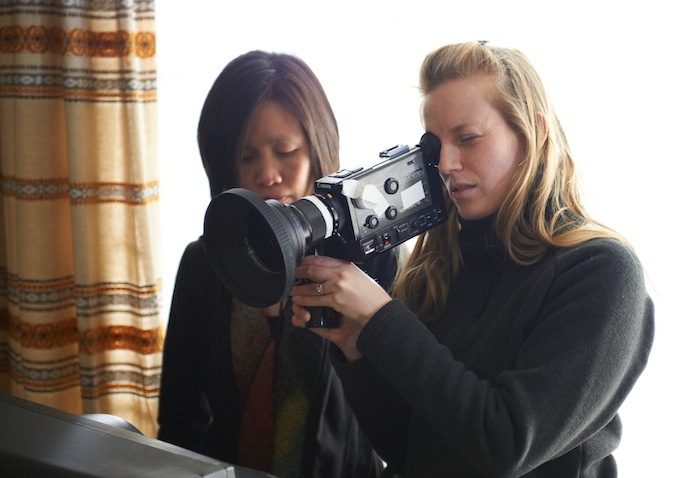
Editor’s note: From the outset, this detailed piece on Sarah Polley‘s recently released Stories We Tell confronts the “facts” in the film directly. For those who have yet to see the film, it is in your best interest to bookmark this and return after viewing, as major spoilers are revealed immediately.
Here are the “facts” of Stories We Tell, the Sarah Polley-helmed docu-drama concerning her own family history:
1) Polley’s mother, Diane, rehearsed and performed in a play in Montreal in 1978 while her husband, Michael, took care of their kids in Toronto.
2) During this time, Diane had an affair in with a film producer named Harry Gulkin.
3) During the course of the affair, Diane became pregnant. While initially contemplating an abortion, she decided to have the child, who became Sarah.
4) Sarah and Harry later met when she was 18, and, while initially convinced that her biological father was an actor named Geoffrey Bowes, Harry told Sarah that he believed he was her father. A biological test proved this fact to 99.97% certainty.
5) Diane passed away when Sarah was only 11, before she could ever explain any of these events to her daughter.
Opening with a quote from the Margaret Atwood novel Alias Grace, Stories We Tell is about the impossibility of a concrete truth — how every narrative, even those surrounding the same set of events, tell us a different story based on memories and attitudes. Although some of this is certainly true — Polley skillfully withholds key facts and employs them as reveals, which change our perception of her mother’s life — I’m left troubled by how different these “stories” really are. Stories We Tell has been lauded by numerous other critics with good merit, as Polley has poured her heart into a film that couldn’t be more personal. But I’m also left somewhat skeptical of whether Polley’s form — to make a self-questioning documentary — actually fits the raw content of her work. In terms of narrative, I’m not sure where the ambiguity of this “story” lies.
Polley’s film contains four major reveals. After a prologue priming us for a film which will openly illustrate Polley’s operation, we get Diane’s “basic story”: she was a loving mother of five children in an ambivalent marriage, but passed away too soon. Then we learn she may have slept around, and there is a good chance that Sarah’s father may not be Michael. Then we get the first major reveal: Polley learns that Gulkin is indeed her father. But then she pulls her own rug on us: Diana was also married before Michael, and that two of the siblings Polley has been interviewing are, in fact, half-siblings. Finally, we get Stories‘ ultimate twist: much of the footage we’ve seen of these supposed Super 8 “home movies” have been staged by Polley, conceived from the events she has been told by others as well as her own memories.
Polley’s effort recalls last year’s The Imposter, the documentary which follows a French con man who skillfully integrates himself into a Texas family. Bart Layton’s film is also manipulative, but its key isn’t in the search for truth — rather, how manipulation creates truth. Layton’s major gambit — leaving the audience to question where they stand on his presented central mystery — is something Polley never does, despite a similar scene wherein the subjects all stare silently into her camera. Stories We Tell would also appear to be about an unsolvable mystery, but given the facts above, what, exactly, is the mystery left?
Polley’s sister, Joanna, comments, “It’s really interesting to look at this one thing that happened and how it’s refracted in so many different ways,” yet I am perplexed at why she believes this. Certainly, she specifically stages the reveal of the first marriage last, as it is supposed to change how we would judge her mother. But the fact of the matter is that the differing perspectives feel much to cohesive. Everyone in the documentary recalls much of the same facts about Diane: she was lively, humorous, very open (both with her feelings and her body) –somewhere between a tragic figure searching for love and an adulterous cheater (much like Michelle Williams in Polley’s prior feature, Take This Waltz).
There are discrepancies between who knew certain details (whether the relationship was very open; who knew if she was dying), but compared to the criminal stakes of The Imposter — or many of Errol Morris’ documentaries, including Tabloid and The Thin Blue Line — these feel strangely arbitrary and rather weightless. The interviewees discuss again and again how different their perspectives are, but the stakes of these discrepancies are too minor to justify this much feeling. Both Gulkin and Michael are compelled to write their version of the events, and Gulkin, at one point, claims that only his story will capture the truth of the matter — but, since Polley has Michael read a good portion of his own, I’m curious to how different Gulkin’s would actually be. From what I can tell, both recall the same portrait of Diane.
At one point, Polley makes clear that, when crafting Stories, she was partly motivated to prevent Gulkin from publishing his own take, as she felt it essential to include a multitude of voices instead of simply the man’s take on these events. Regardless, Stories We Tell comes to consist of these people discussing the indelible nature of truth instead of actually investigating it, never giving a sense of what’s missing from one story or another. There’s something oddly off: the family members feel slightly congratulatory about their philosophical revelations but never inquisitory. What manages to prompt them is left too ambiguous, and Polley seems so intent on revealing herself as a manipulator in the process that it overtakes any issues of fact, almost completely removed from the content at hand. Instead of letting the questions about the nature of truth develop organically out of her process, I felt as if Polley had almost forced this “nature of truth theme” onto the film.
Somewhere in this issue might be Polley’s own presence in Stories We Tell — or, lack thereof. She’s physically visible throughout, but we rarely get a sense of her own motivation and what’s been guiding her through this undertaking. She never makes clear what, as a child, her relationship to her mother was like, nor how these new stories change the way she feels. There’s a scene where her father reads an email addressed to Polley, which asks whether the documentary (and the self-questioning one about the nature of truth) is a shield to hide both her actual guilt and the confrontation of personal emotions. It almost feels like Polley is “hanging a lantern,” a term used in TV writing to point out one’s own faults as a means of justifying them. Stories We Tell never feels like the “interrogation” Polley has promised at the start, but instead a meandering search for meaning that, as it so happens, leads to the final paradox: Stories We Tell constantly tells us about the manner in which narratives refract perception and truth, but the multitude of voices don’t leave ambiguity. What they create is a cohesive story.
Perhaps my issues with Stories We Tell come down to the film’s valuing of feelings over actual facts — that the differences are less what happens than how we feel about these people and their lives. While the film portends great themes about narrative, truth, and cinema, it is really Polley’s personal attempt to work through the relationship with a mother she never truly got to know — a desire so strong that she feels compelled to create her own Super 8 memories of her. The emotional core of Stories We Tell develops out of one’s inability to tell the past, but I would argue that the content she presents never reflects truth. Polley, to her absolute credit, is a very clear and concise storyteller, but perhaps not one fit for the lofty themes her film aspires toward.
This feature marks Peter Labuza‘s debut piece for The Film Stage and one can read more from him on Twitter, his official site, as well as his podcast, The Cinephiliacs.

